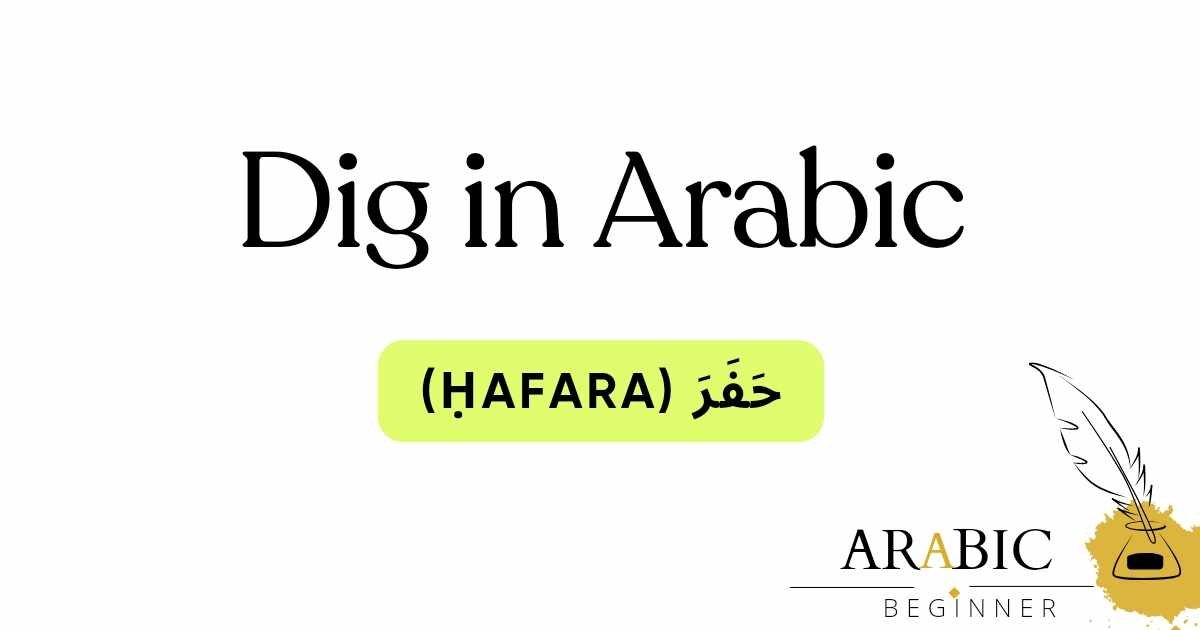To understand the verb “to dig” in Arabic, we need to explore its past, present, and imperative (command) forms along with examples and their transliteration. Arabic verbs are based on a root system, and the root for “dig” is حَفَرَ (ḥafara). Let’s break down the forms:
- Past Tense (Perfect): The past tense in Arabic is used to describe actions that have been completed. For “he dug,” the verb would be حَفَرَ (ḥafara).
- Example: “He dug a hole.” – حَفَرَ حُفْرَةً (ḥafara ḥufratan)
- Transliteration: “Ḥafara ḥufratan.”
- Present Tense (Imperfect): The present tense in Arabic indicates an action that is ongoing or habitual. The present tense for “he digs” is يَحْفُرُ (yaḥfuru).
- Example: “He digs a hole every day.” – يَحْفُرُ حُفْرَةً كُلَّ يَوْمٍ (yaḥfuru ḥufratan kulla yawmin)
- Transliteration: “Yaḥfuru ḥufratan kulla yawmin.”
- Imperative (Command): The imperative form is used for commands. For “dig!” the verb would be اِحْفُرْ (iḥfur).
- Example: “Dig a hole!” – اِحْفُرْ حُفْرَةً (iḥfur ḥufratan)
- Transliteration: “Iḥfur ḥufratan.”
Note that Arabic verbs are conjugated differently based on the subject (I, you, he, she, etc.), and the examples provided here are in the masculine singular form. Arabic also inflects verbs for gender, number, and sometimes dual forms.
Arabic of Dig in Different Forms
In Arabic, verbs are conjugated according to tense, person, and number. The root for “to dig” is حَفَرَ (ḥafara).
Here are the forms for different persons in both the past and present tenses, along with the imperative form.
Note that Arabic verbs also change based on gender, so I’ll include both the masculine and feminine forms where applicable.
Past Tense (Perfect)
- I dug
- Masculine/Feminine: حَفَرْتُ (ḥafartu)
- You dug (singular)
- Masculine: حَفَرْتَ (ḥafarta)
- Feminine: حَفَرْتِ (ḥafarti)
- He dug
- حَفَرَ (ḥafara)
- She dug
- حَفَرَتْ (ḥafarat)
- We dug
- حَفَرْنَا (ḥafarnā)
- You dug (plural)
- Masculine: حَفَرْتُمْ (ḥafartum)
- Feminine: حَفَرْتُنَّ (ḥafartunna)
- They dug
- Masculine: حَفَرُوا (ḥafarū)
- Feminine: حَفَرْنَ (ḥafarna)
Present Tense (Imperfect)
- I dig
- Masculine/Feminine: أَحْفُرُ (aḥfuru)
- You dig (singular)
- Masculine: تَحْفُرُ (taḥfuru)
- Feminine: تَحْفُرِينَ (taḥfurīna)
- He digs
- يَحْفُرُ (yaḥfuru)
- She digs
- تَحْفُرُ (taḥfuru)
- We dig
- نَحْفُرُ (naḥfuru)
- You dig (plural)
- Masculine: تَحْفُرُونَ (taḥfurūna)
- Feminine: تَحْفُرْنَ (taḥfurna)
- They dig
- Masculine: يَحْفُرُونَ (yaḥfurūna)
- Feminine: يَحْفُرْنَ (yaḥfurna)
Imperative (Command)
- Dig! (singular)
- Masculine: اِحْفُرْ (iḥfur)
- Feminine: اِحْفُرِي (iḥfurī)
- Dig! (plural)
- Masculine: اِحْفُرُوا (iḥfurū)
- Feminine: اِحْفُرْنَ (iḥfurna)
These forms are in Modern Standard Arabic. In spoken dialects, the forms can vary significantly.

